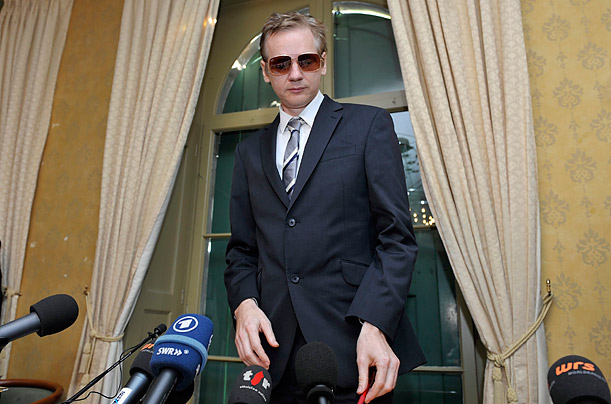
(2 of 3)
Yet for all the efforts to bar the stable door, there has been little agreement on what has happened. Had the world just witnessed an act of journalism? Theft? Public service? Espionage? As talk turned to action, U.S. Attorney General Eric Holder had little doubt, announcing a "very serious, active, ongoing" criminal investigation, and sources said the FBI sought foreign-intelligence warrants to search for evidence of contact between WikiLeaks and Army Private First Class Bradley Manning before the soldier allegedly sent his trove of documents on a compact disc.
An important legal precedent loomed. If Assange did nothing more than accept the disc and publish its contents, lawyers in and out of government said, criminal charges against him would put the New York Times and other news organizations in equal jeopardy. The Espionage Act of 1917 is so vaguely drafted, according to Louis Klarevas of New York University's Center for Global Affairs, in a recent post at TheAtlantic.com, that it could be "interpreted as making it illegal to post a link to WikiLeaks on your Facebook page." Conspiracy to steal government property, another charge under consideration, faces much the same objection if it is defined as asking a source for information to be published.
Nor was the threat of legal action the only way authorities responded. A sustained assault on the economic and structural foundations of WikiLeaks soon followed. The Swiss bank PostFinance closed WikiLeaks' account because Assange is not a full-time resident of Switzerland (as if that always mattered to Switzerland's famously discreet banking industry). Visa and MasterCard, which process payments for the Ku Klux Klan, cut off WikiLeaks — "pending further investigation," Visa said, "into the nature of its business." PayPal ejected WikiLeaks for promoting illegal activity, which has yet to be alleged in court. Amazon, a major Web-hosting provider, removed WikiLeaks from its servers after a telephone call from Senator Joe Lieberman, chairman of the Homeland Security Committee.
Because public access to the Internet relies on private companies, these precedents were alarming. "This is absolutely a tipping point," says Ethan Zuckerman, a fellow at Harvard's Berkman Center for Internet & Society. "This should be a very clear call to anyone who takes freedom of speech online seriously." Many foreign leaders, even U.S. allies, agree. Brazilian President Luiz Inácio Lula da Silva pledged support for Assange and accused Washington of mounting a "siege on freedom of expression." Bolivian Vice President Alvaro García Linera responded by hosting WikiLeaks cables on his official government website.
Assessing the real-world impact of WikiLeaks will take some time. On the one hand, with far richer access to the workings of their governments, citizens and scholars were able to assess the performance of elected leaders and take part in the direction of policy. But mainstream advocates of open government were prepared to acknowledge the costs. Steven Aftergood, a relentless campaigner against excessive secrecy and director of the Federation of American Scientists, says Assange "fails to comprehend that some uses of secrecy serve to strengthen and defend an open society against attack from without or subversion from within."
And in that connection, the costs of the WikiLeaks affair were hard to predict. Would Iran, for example, slow its nuclear-enrichment program after reading Saudi King Abdullah's plea for U.S. forces to destroy it, or would the Saudis rush to mollify their powerful neighbor? Would Italian voters tolerate a Prime Minister who, by the U.S. ambassador's account, appeared to be "profiting personally and handsomely" from sweetheart energy deals with Russia? Would bruising personal observations about the Russian Prime Minister, the British royal family, the French President, the German Chancellor and — oh, my — the First Lady of Azerbaijan ("poorly informed"; "substantial cosmetic surgery") hurt delicate relationships?
These secrets were not, by any measure, the crown jewels of U.S. classified archives. None of the diplomatic cables obtained by WikiLeaks were top secret, and none bore the NODIS stamp to indicate restricted distribution of close-hold material. The U.S. government has suffered graver losses. American spies sold their Soviet handlers the design of the hydrogen bomb, the names of double agents, the keys to American cipher codes and locations of U.S. eavesdropping equipment.